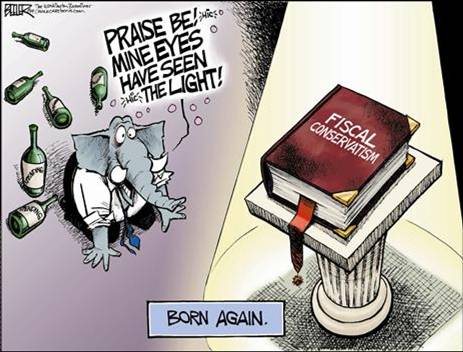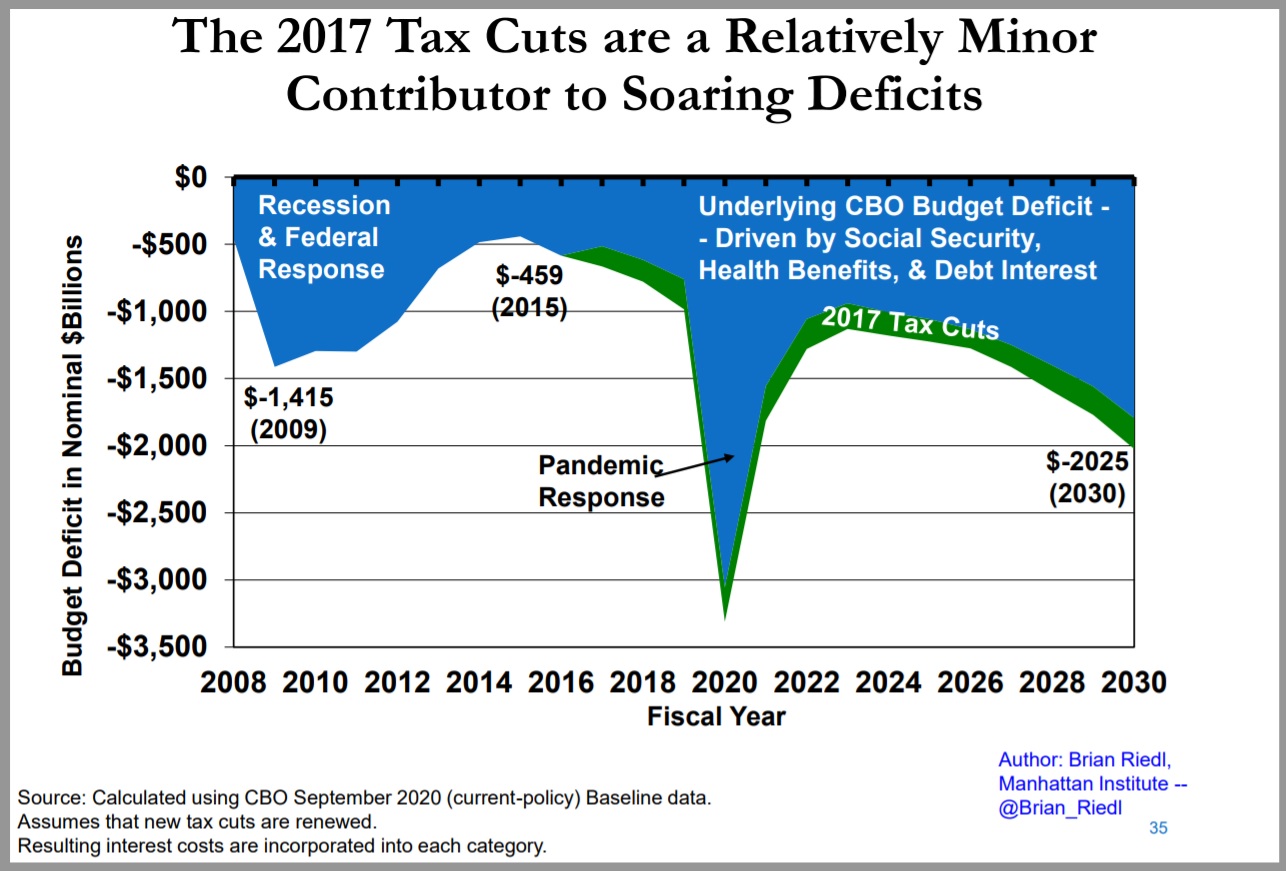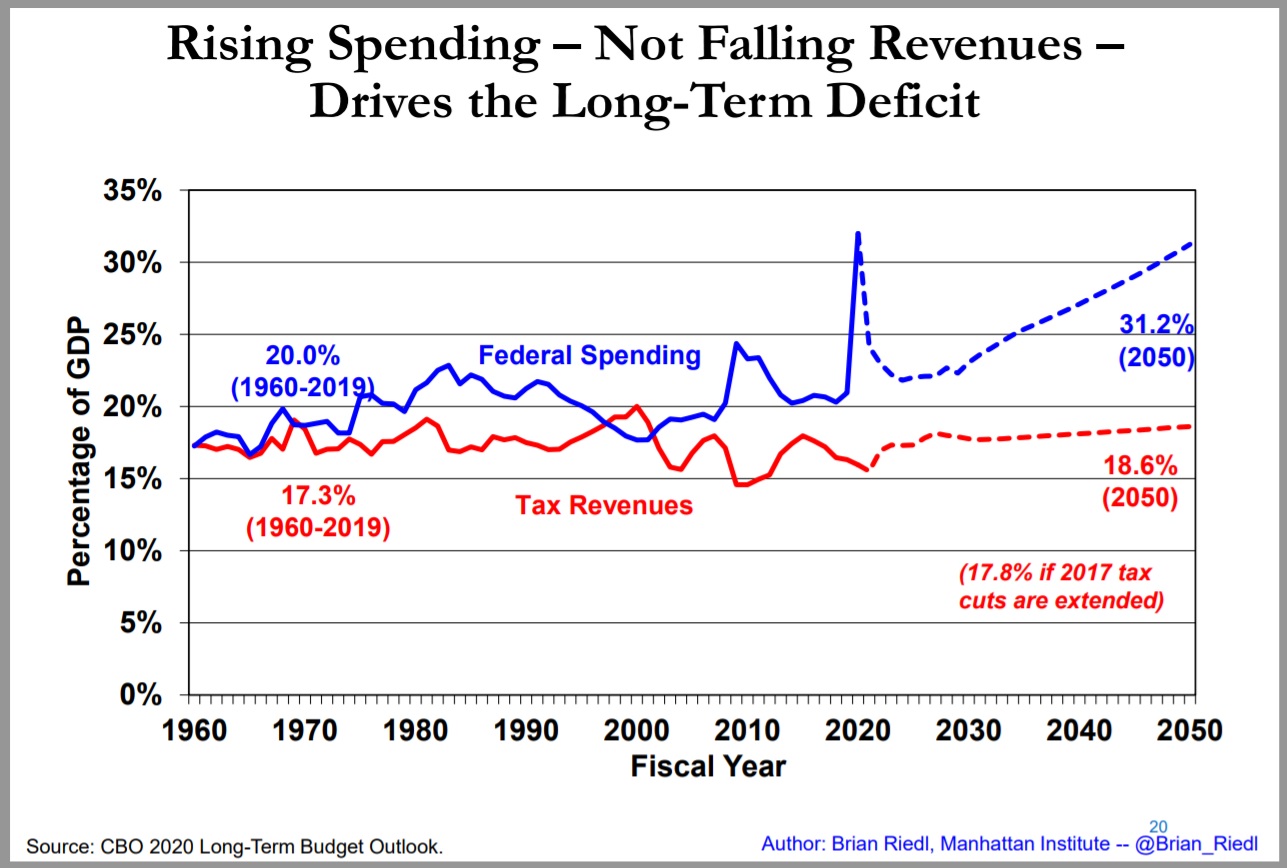January 23, 2021 by Dan Mitchell @ International Liberty
I have relentlessly criticized Republicans in recent years for being profligate big spenders.
But I have some good news. The GOP is finding religion and is once again fretting about big government. The bad news is that many of them are total hypocrites. The only reason that they’re now beating their chests about fiscal responsibility is that there’s now a Democrat in the White House pushing for big government rather than a Republican in the White House pushing for big government.
Talking a few days ago with Politifact, I remarked on the GOP’s battlefield conversion.
“The very narrow Democratic majorities in the House and Senate will make big policy changes difficult for Biden,” said Daniel Mitchell, a conservative economist with decades of experience in Washington. “Republicans were big spenders under Trump, but they’ll dust off their fiscal conservatism rhetoric with Biden in the White House. …”There will be unanimous, or near-unanimous, GOP opposition to the tax increases,” Mitchell said. That could make passage difficult.
I’m not the only one to notice Republicans change their spots when Democrats are in charge. In her Washington Post column, Catherine Rampell also notes their hypocrisy.
It’s almost like clockwork. As soon as a Democrat enters the White House, Republicans pretend to care about deficits again. …And so Republicans laid the groundwork for blocking the Biden administration’s request for more covid-19 fiscal relief, on the grounds that further spending is not merely unnecessary but also irresponsible. …These foul-weather fiscal hawks neglect to mention, …before the coronavirus pandemic — the Republican-controlled Senate passed and President Donald Trump signed spending bills that added…$2 trillion to deficits.
If Ms. Rampell’s column focused solely on Republicans behaving inconsistently, I would fully applaud. Unfortunately, she also used the opportunity to make some assertions that deserve some pushback. Beginning with what she said about the 2017 tax reform.…the GOP’s prized 2017 tax cuts added nearly $2 trillion to deficits.
It is true that the legislation is a short-run tax cut, but there’s no long-run revenue reduction because many of the provisions expire at the end of 2025. And, as Brian Riedl made clear in this chart, the tax cuts only play a tiny role even if all the provisions ultimately are made permanent.
Ms. Rampell then makes a Keynesian argument that more spending would be stimulative.
…the U.S. economy actually needs more federal spending, and President Biden has proposed a $1.9 trillion plan… Republicans objecting to Biden’s proposal…seem to be writing off the need for more relief entirely, at least now that a Democrat is president.
Is she right about Republican hypocrisy? Yes. Is she right that bigger government produces growth? No.
If Biden and the Democrats were simply arguing that some level of handouts are needed and justified to compensate for government-mandated shutdowns, I wouldn’t be happy, but I also wouldn’t complain. But I do object to the mechanistic argument that government can magically produce prosperity by borrowing money from the economy’s left pocket and putting it in the economy’s right pocket.
At best, the borrow-and-spend approach only produces a transitory bump in consumption, but does nothing for real problem of inadequate income (which is why we should focus on GDI rather than GDP). She also engages in a bit of historical revisionism about Obama’s failed stimulus from 2009.
This is, not coincidentally, almost exactly what they did about a decade ago. …Republicans suddenly demanded to turn off fiscal (and monetary) spigots once Barack Obama was elected.
In reality, Republicans didn’t control either the House or Senate in Obama’s first two years. He was able to adopt his so-called stimulus. And the economy was stagnant. Republicans did win the House at the end of 2010 and were somewhat successful in controlling spending for the next few years. And that’s when the economy did better. Just like it did better during the Reagan and Clinton years when there was spending restraint.
To put this discussion in the proper context, I’ll close with another chart from Brian Riedl. The long-run problem we face is not red ink. Deficits and debt are merely the symptom of the real problem of excessive government spending.
P.S. I wish Politicifact had identified me as a libertarian. I’m only willing to be called a conservative if that means Reaganism, but I worry it now means Trumpism.
(My Take - Clearly I like Dan's views on much of what he writes about regulation, spending, economics and government, especially his analysis of the GOP hypocrisy, or I wouldn't publish so many of his articles, but not all. I've never quite understood this position with Dan about Trump, except his antipathy toward Trump's trade sanctions, which brought good results.
That's why I can never entirely agree with so many of the positions libertarians take, or understand how they can justify those position in light of history and human behavior, including, and especially, immigration, which I've highlighted today in some posts with this question: Can you really believe they will integrate and become productive law abiding citizens? The second question everyone needs to ask: Why does any society "need" immigrants? For the benefit of the host country, or, for the benefit of the immigrant? That will be the thrust of a future article of my own.
If you wish to criticize Trump for not curtailing spending, I can agree with that, but I think you have to ask, with a Congress, both sides of the aisle, clearly being against cutting the budget, what exactly does anyone think he was he supposed to do? RK)




No comments:
Post a Comment